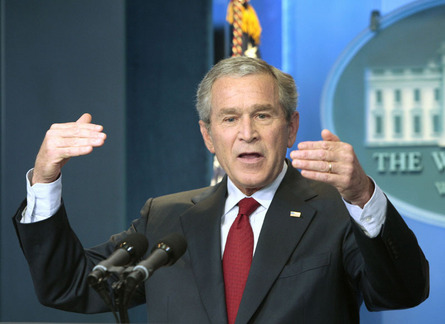Bold action needed to rescue financial institutions, Bush says
 Washington- President George W Bush said Saturday that bold action was needed to bailout US financial institutions and prevent a broader economic collapse.
Washington- President George W Bush said Saturday that bold action was needed to bailout US financial institutions and prevent a broader economic collapse.
The Bush administration, seeking to head off the country's worst financial crisis since the Great Depression of 1929, moved this week to soak up the brunt of banks' mortgage-related assets, back money market mutual funds, curb certain stock-trading techniques and make more money available for loans to consumers.
The emergency measures mark the largest ever intervention by the US government and could cost taxpayers hundreds of billions of dollars.
"This is a big package because it was a big problem," Bush said during a meeting at the White House with Colombian President Alvaro Uribe.
Bush said he was working with Congress to act swiftly on legislation to pay for the plan, and top US finance officials were meeting with lawmakers over the weekend to finalize the details to takeover the mortgage assets, which have plummeted in value and are at the centre of the financial crisis.
Bush warned that credit availability for everything from houses and cars to student loans could dry up, bringing to a complete halt the borrowing on which much of the US economy is based.
"The collapse of one part of the system would affect the average citizen," Bush said. "It would affect their capacity to borrow money."
Few exact details of the plan have been revealed, but it essentially involves creating a new government agency, which could soak up all the bad assets that have already brought down a number of Wall Street giants and could wipe out many more.
Bush said the cost to taxpayers will be replenished as the economy recovers over time. "The taxpayers are going to get a lot of that money back," he said.
Lehman Brothers Holdings Inc's 600-billion-dollar bankruptcy filing on Monday was the largest in US history. On Tuesday, the Federal Reserve took control of the largest US insurer, American International Group Inc, in an 85-billion-dollar bailout.
The Treasury also announced a 50-billion-dollar guarantee programme for money-market mutual funds as panicked account holders started withdrawing their investments during the week. The Federal Reserve in conjunction unveiled new loan programmes to banks dealing in money-market funds.
Also, the Securities and Exchange Commission temporarily banned the practice of short-selling, a stock trading technique that critics argue has helped fuel a furious sell-off of financial stocks on Wall Street this week.
News of the government intervention appeared to calm some fear on Wall Street Friday, as stocks indices began to stabilize after days of steep decline. (dpa)